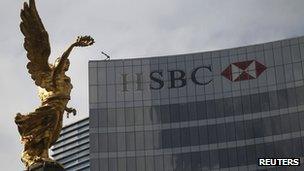Are some banks too big to jail?
- Published
- comments

HSBC in Mexico City - launderers deposited money using boxes designed to fit the bank's counter windows
How could and should the justice system deal with miscreant banks when there are likely to be "collateral consequences" for the innocent - including you and me - from the more severe punishments?
Tomorrow there should be another chance to assess the practice of punishing banks that do wrong, while trying to spare innocent customers and bystanders, when the fines and sanctions against the enormous Swiss bank UBS for its role in the Libor-rigging scandal may well be confirmed and explained.
That issue of the "collateral consequences" from bank spanking was cited by US Assistant Attorney General Lanny Breuer when explaining why the Department of Justice had chosen not to "fully prosecute" HSBC for its money laundering and sanctions breaching offences - and had instead put the bank on probation with a deferred prosecution agreement.
On the one hand, Mr Breuer said this, about HSBC's past conduct:
"From 2006 to 2010, the Sinaloa Cartel in Mexico, the Norte del Valle Cartel in Colombia, and other drug traffickers laundered at least $881m in illegal narcotics trafficking proceeds through HSBC Bank USA. These traffickers didn't have to try very hard. They would sometimes deposit hundreds of thousands of dollars in cash, in a single day, into a single account, using boxes designed to fit the precise dimensions of the teller windows in HSBC Mexico's branches."
So, for some - such as the journalist Matt Taibbi in Rolling Stone - it is scandalous that criminal charges should not be brought against HSBC, given that many thousands of US citizens are jailed every year for possessing relatively small quantities of drugs (see Outrageous HSBC Settlement Proves the Drug War is a Joke, Rolling Stone, external).
Book throwing
Also, over at BP a contrast has been noted between what it sees as the book being thrown at it by the Department of Justice for the oil disaster in the Gulf of Mexico - a guilty plea for serious crimes and the prosecution of three executives - and perhaps not such a weighty tome being lobbed at HSBC.
Mr Breuer denies that HSBC got off lightly. HSBC has had to mend its ways, avoid committing any kind of offence while on probation and pay penalties and forfeits of $1.9bn (it is worth pointing out, however, that $1.9bn is just 38% of what HSBC calls its "underlying" pre-tax profit for the three months to September 30, so the penalties and forfeits are affordable and absorbable).
What apparently weighed on Mr Breuer was that a criminal indictment of HSBC could have led it to lose its banking licence in New York.
This could have destroyed HSBC's relatively small US retail banking business and - more importantly - severely impaired its ability to conduct business anywhere in the world: the reputational damage of being blacklisted in America would have been terrible and, without access to dollars from the New York Fed, HSBC's vast international wholesale operations would have been in trouble.
As Mr Breuer put it: "The goal is not to bring HSBC down."
Too much?
So does this mean, to use a resonant phrase gaining a good deal of global traction thanks to the power of social media, that banks such as HSBC are not only "too big to fail" but also "too big to jail"?
When a bank becomes a lynchpin of the global economy, in the way that HSBC has done, are the hands of justice shackled in relation to it - because a proper spanking would be too much for a fragile global economic recovery to bear?
It is an important question. And one that the parliamentary committee on banking standards here in the UK, chaired by Andrew Tyrie, will probably be examining.
To be clear, however, even 30 years ago, before banks became quite as big and global as HSBC, it was never easy for the authorities to strip a bank of its licence. The disruptive impact on savers, businesses and the wider economy was always a significant deterrent to imposing the ultimate sanction on a misbehaving bank.
And for what it's worth - and you can judge whether it's worth a lot or a little - bankers themselves do not believe they're being given an easy ride by the authorities.
Painful
The boss of one of the world's biggest banks told me over the weekend that the greatest threat to the recovery of his bank and of the British economy - in his view - is the ever rising burden of fines and compensation faced by all banks for their sloppy, reckless and rule-breaking ways in the boom years.
Even for HSBC, there may be painful ramifications for many years yet of the money-laundering settlement.
First, because HSBC's former chairman, Lord Green, is a minister in David Cameron's government, the opposition Labour party has a powerful interest in shouting loudly and often about what Mr Breuer called the laundering by HSBC of billions of dollars accrued by narcotics' traffickers and others.
Second, for HSBC the most important region in the world for it in a commercial sense is Asia, and that happens to be where governments take a particularly dim view of any kind of trade in illegal drugs.
Or to put it another way, it will be months before it is clear whether HSBC will lose important custom because of the taint that it did huge business with Mexican drugs bosses.